Featured
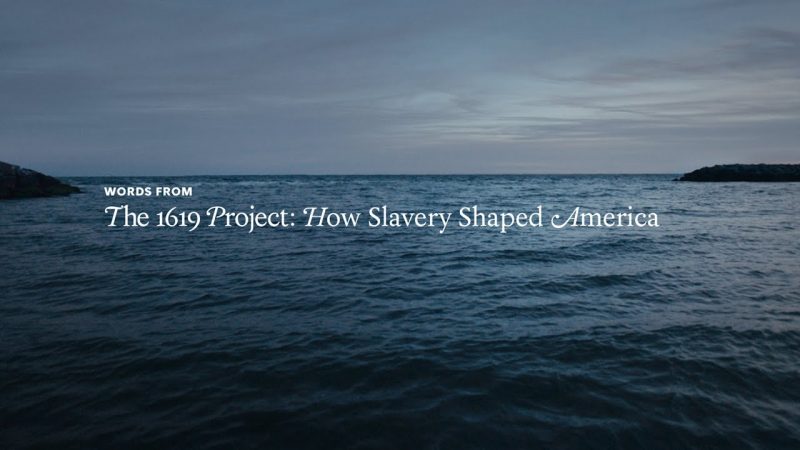 Republicans in three states are trying to ban the 1619 Project from schools. By Laura Clawson / Daily Kos
Republicans in three states are trying to ban the 1619 Project from schools. By Laura Clawson / Daily Kos
The 1619 Project is not losing its status as a favored punching bag of Republicans—in fact, the campaign against it has entered a new, dangerous stage. Efforts by Donald Trump and Sen. Tom Cotton to ban the collection commemorating the 400th anniversary of the arrival of the first enslaved Africans in what later became the United States were symbolic, because the federal government does not set curriculum. The 1619 Project seeks to fully write Black people into the center of U.S. history—where they have been all along, even if the written histories have often excluded or marginalized them. State legislators in Arkansas, Iowa, and Mississippi want to keep pushing Black people to the edges of the teaching of history, and they want to write that into law. That’s not symbolic, because state legislatures can set curriculum. Read more
Political / Social
 Trump Trial Also A Referendum On Authoritarianism In America. By S.V. Date / HuffPost
Trump Trial Also A Referendum On Authoritarianism In America. By S.V. Date / HuffPost
As the Senate readies for yet another Donald Trump impeachment trial and prepares to judge the former president’s conduct, senators also may be voting on a much bigger question: American democracy versus American authoritarianism. Because, while Trump is charged specifically with inciting the Jan. 6 insurrection at the U.S. Capitol, his and his allies’ and supporters’ own words show that the assault was the culmination of a monthslong attempt to overturn the election he lost and included a discussion of invoking martial law. Read more
 Republicans advance more than 100 bills that would restrict voting in wake of Trump’s defeat. By Jane O. Timm / NBC News
Republicans advance more than 100 bills that would restrict voting in wake of Trump’s defeat. By Jane O. Timm / NBC News
State lawmakers are considering more than 100 laws that would make it harder to vote, according to an analysis conducted by the Brennan Center for Justice at New York University School of Law. This number represents almost triple the number of similarly restrictive bills under consideration this time last year, according to the analysis. Read more
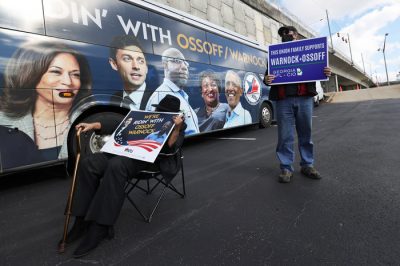 How Democrats Found Thousands Of New Voters And Flipped Georgia’s Senate Seats. By Emma Hurt / NPR
How Democrats Found Thousands Of New Voters And Flipped Georgia’s Senate Seats. By Emma Hurt / NPR
It’s been about a month since Democrats flipped Georgia’s two Senate seats in high-profile January runoffs, sending Raphael Warnock and Jon Ossoff to Washington, D.C., and handing the party narrow control of the chamber. One key to the stunning upsets were the roughly 225,000 new voters who didn’t vote in November but turned out in January, a disproportionate number of whom were people of color. Read more
 How Biden could help narrow the racial wealth gap with just one appointment. By Helaine Olen / Wash Post
How Biden could help narrow the racial wealth gap with just one appointment. By Helaine Olen / Wash Post
Most of us, I would guess, realize that the United States faces an overdue reckoning with how we’ve treated non-White Americans, such as the fact that for every dollar a White family with children possesses, a Black family with children has just 1 cent, while Hispanic families with children have 8 cents. The OCC is well positioned to help change this reality, as it implements and enforces laws on everything from fair housing to credit access in low- and moderate-income neighborhoods. And there is a perfect candidate to lead the agency: Mehrsa Baradaran. Read more
 It will take more than the George Floyd Justice in Policing Act to fix our broken system. By John Rappaport and Ben Grunwald / Wash Post
It will take more than the George Floyd Justice in Policing Act to fix our broken system. By John Rappaport and Ben Grunwald / Wash Post
Mensah’s story is not unique. As American communities tackle police reform, they can and should take steps to prevent officers like him from being rehired. Consider these stories: Eddie Boyd III allegedly pistol-whipped a 12-year-old girl and falsified a police report in St. Louis before resigning and landing in Ferguson, Mo., of all places. Nicholas Hogan pepper-sprayed a suspect who was restrained on a hospital gurney; he was fired from the Tukwila, Wash., police, hired by a neighboring force, then fired again. Read more
Related: A Road Map for Getting Rid of Racist Cops. By Samantha Michaels / Mother Jones
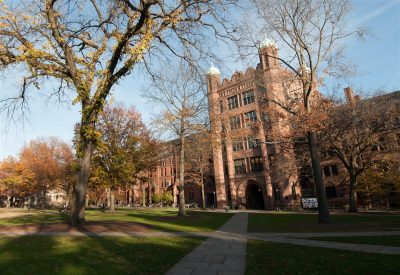 In Biden administration reversal, Justice Dept. drops discrimination suit against Yale. By Pete Williams / NBC News
In Biden administration reversal, Justice Dept. drops discrimination suit against Yale. By Pete Williams / NBC News
The Justice Department told a federal judge Wednesday that it is dropping a high-profile discrimination lawsuit against Yale University that was brought by the Trump administration. A two-sentence filing in U.S. District Court in Connecticut gave notice of the government’s “voluntary dismissal of this action.” The case had marked an escalation in the Trump Justice Department’s attacks on affirmative action programs that many conservatives consider illegal. Read more
 Latino-owned businesses are seeing record growth. Big banks are still not funding them. By Brandon Gomez / NBC News
Latino-owned businesses are seeing record growth. Big banks are still not funding them. By Brandon Gomez / NBC News
Despite being the fastest-growing segment of the U.S. small business ecosystem, Latinos continue to struggle to secure capital from national banks. That’s according to the State of Latino Entrepreneurship 2020 research study from the Stanford Latino Entrepreneurship Initiative. “Over the last five years we’ve really been able to dig deep into the challenges facing the Latino segment,” said Marlene Orozco, lead research analyst of the Stanford Latino Entrepreneurship Initiative. Read more
 The Rise and Fall of Bitcoin Billionaire Arthur Hayes. By Adam Ciralsky / Vanity Fair
The Rise and Fall of Bitcoin Billionaire Arthur Hayes. By Adam Ciralsky / Vanity Fair
Arthur Hayes lives large. Like Bobby Axelrod-in-Billions large. Just replace New York with Hong Kong and infuse it with a dose of Silicon Valley—where unicorns spring from the minds of irrepressible company founders—and, well, you get the picture. One minute Hayes is hitting the powder in Hokkaido, the next he’s crushing it on a subterranean squash court in Central—Hong Kong’s Wall Street. And all the while he keeps one eye trained on an obscure-sounding currency exchange that he built out of thin air and through which more than $3 trillion has flowed. Read more
 Black Doctors’ COVID Burden: Patients’ Social Ills and Workplace Bigotry | Healthiest Communities Health News. By Joseph P. Williams / U.S. News
Black Doctors’ COVID Burden: Patients’ Social Ills and Workplace Bigotry | Healthiest Communities Health News. By Joseph P. Williams / U.S. News
For Dr. Steven McDonald, being a black man in a white coat has never been easy. An emergency department physician in New York City, McDonald has had to thicken his skin against the slings and arrows he suffers as an African American working in a predominantly white profession: Workplace slights, both obvious and subtle, from colleagues’ questioning his qualifications – couched in polite small talk – to bigoted white patients asking for another doctor. Read more
 Atlanta Falcons owner donating $17M to civil rights museum. By Associate Press and ABC News
Atlanta Falcons owner donating $17M to civil rights museum. By Associate Press and ABC News
The billionaire owner of the Atlanta Falcons is donating $17 million to help a civil rights museum expand and offer new programming. Arthur Blank’s family foundation announced the gift to the National Center for Civil and Human Rights on Thursday. The vast majority of the money will fund a new, three-story west wing at the downtown Atlanta museum that will include space to educate visitors about lynching. Read more
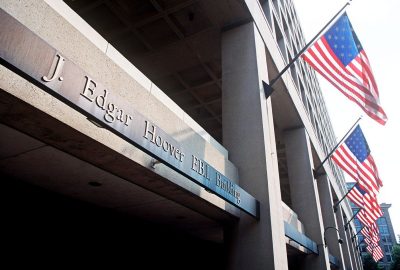 How racial diversity can help the FBI solve its “privilege naiveté” problem. By Iveta Cherneva / Salon
How racial diversity can help the FBI solve its “privilege naiveté” problem. By Iveta Cherneva / Salon
Improving racial diversity at the FBI is not just a question of optics (how the bureau looks) or doing the “right thing” for the sake of inclusivity. There is a clear functional argument in the sense that racial diversity makes the FBI smarter. But that’s not something that the FBI has yet admitted publicly. It is time to push them to say it. So far, the institution has taken the “unique” and “unique perspectives” approach, which is a claim that people of color are recognized for their differences, not an admission that people of color actually make the FBI better and smarter. “Not better, different” is a politically correct construction that can comfortably apply to some situations, but the nuance here is telling. Read more
Historical / Cultural
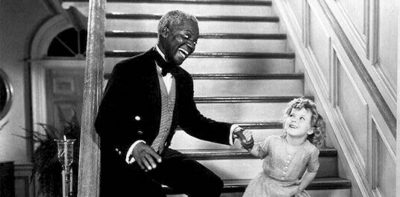 How ‘Uncle Tom’ still impacts racial politics. By Cheryl Thompson / The Conversation
How ‘Uncle Tom’ still impacts racial politics. By Cheryl Thompson / The Conversation
Published nearly 170 years ago, Uncle Tom’s Cabin by Harriet Beecher Stowe had a profound impact on American slavery. But Uncle Tom is not a relic from the 19th century: this complex figure still has a hold over Black politics. In fact, the Uncle Tom stereotype is quite possibly the most resilient figure in American history. He has survived pandemics, lived through 33 presidents (including President Joe Biden), and remains the most recognizable Black character in history. Read more
Related: TX GOP Chair Endorses Holding A Vote On ‘Texit.’ By Cristina Cabrera / TPM
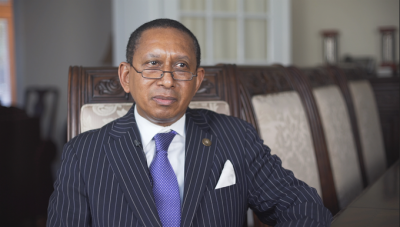 The Plan to Build a Capital for Black Capitalism. By Kelefa Sanneh / New Yorker
The Plan to Build a Capital for Black Capitalism. By Kelefa Sanneh / New Yorker
Floyd McKissick, a lawyer who had risen through the ranks to become the leader of the Congress of Racial Equality, or core, which he helped transform into a militant alternative to more cautious civil-rights organizations like the National Association for the Advancement of Colored People. He left core, it seems, not so much because he wanted to make money as because he felt that the best way to help Black people in America was to help some of them make money. Healy argues that McKissick’s dream of a new Black homeland in rural North Carolina could have come true, if not for the backlash it inspired. “It was going to be a beautiful place to live,” one of the earliest residents said. Read more
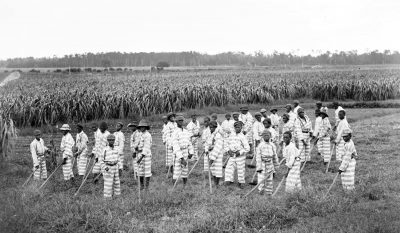 How a Three-Word Phrase Sabotaged Black Voting Rights, and How They Can Be Reconstructed. By Pema levy / Mother Jones
How a Three-Word Phrase Sabotaged Black Voting Rights, and How They Can Be Reconstructed. By Pema levy / Mother Jones
In 1866 Congress passed the 14th Amendment and sent it to the states for ratification. In the second section of the amendment, the antislavery Republicans sought to enfranchise the freed men in the South. But rather than affirmatively extend the franchise, they devised a way to punish states that did not allow Black men to vote: Should a state disenfranchise its Black men, its congressional delegation would be reduced in proportion to the number of those excluded from the vote. But the architects of this approach left a loophole: States would not see their delegations reduced for citizens disenfranchised “for participation in rebellion, or other crime.” In North Carolina, white supremacists decided to turn every Black man they could into a convict, taking away his right to vote while preserving their power in Congress. Read more
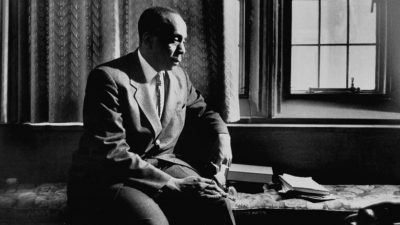 When Gandhi Introduced America’s Civil Rights Leaders to Nonviolence. By Peter Eisenstadt / The Daily Beast
When Gandhi Introduced America’s Civil Rights Leaders to Nonviolence. By Peter Eisenstadt / The Daily Beast
Howard Thurman was born in Florida in November 1899, and was raised in Daytona, primarily by his mother and grandmother. By dint of his native intelligence, determination, and ability to circumvent a system that was established to thwart black Floridians, he received a first-rate education at Morehouse College and Rochester Theological Seminary and thereafter became an influential minister, much in demand before both Black and white audiences. He was one of the first prominent Black advocates of radical nonviolence, and in 1936 met with Mahatma Gandhi in India. Read more
 2 Confederate statues were removed in Georgia within 3 days. By Hollie Silverman and Melissa Alonso / CNN
2 Confederate statues were removed in Georgia within 3 days. By Hollie Silverman and Melissa Alonso / CNN
Two Confederate statues were removed from public locations in the state of Georgia this week. This comes as cities across the nation have grappled with how to handle statues of historical figures with troubling pasts, including Confederate generals, slave owners and colonizers. As calls for social justice rang out throughout the country following the death of George Floyd at the hands of former Minneapolis Police officers, many monuments were vandalized, spray painted or even torn down by the public. Read more
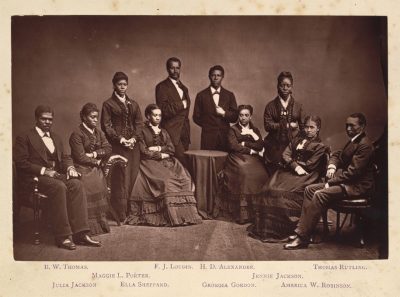 Black music is Black history: Our spirituals. By Denise Oliver Velez / Daily Kos
Black music is Black history: Our spirituals. By Denise Oliver Velez / Daily Kos
Though Black music has taken many forms over time, changed with each generation, and been performed in many different cultures by ethnic and racially diverse artists, many of whom are not Black, there is a fundamental thread that ties it all together: Black spirituality. When I speak of “spirituality,” I do not mean religiosity, though many Black musicians and their music have come out of the Black church. I speak of a force that combines both the will to endure and survive with the joy of life. So let us begin this BlackMusicSunday with Black spirituals. Shown are the Fisk Jubilee Singers. Read more
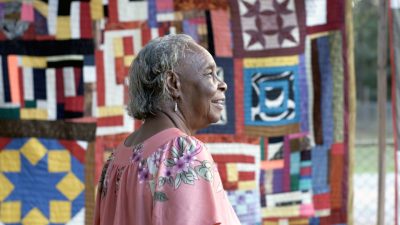 What It Means to Be Black in America. Six short films for Black History Month. By NYT
What It Means to Be Black in America. Six short films for Black History Month. By NYT
Shown is the film, “While I Yet Live.” A close-knit group of rural African-American women have perfected the distinctive art of quilting. Gee’s Bend is a rural community in lower Alabama that is widely recognized for its extraordinary quilts. The quilts reflect a collective history and a deep sense of place. And they register the bold individual voices of the women who made them. Watch here
 Amanda Gorman Interviewed by Michelle Obama / Time
Amanda Gorman Interviewed by Michelle Obama / Time
Amanda Gorman captivated the world when she read her poem “The Hill We Climb” at President Joe Biden and Vice President Kamala Harris’ Jan. 20 Inauguration ceremony. Sitting just feet away from the 22-year-old that day was former First Lady Michelle Obama, who had met Gorman twice before—in 2016 at a White House event for the National Student Poets program and again at a 2018 event for Black Girls Rock, an organization that seeks to empower women and girls. Gorman, who was named the first National Youth Poet Laureate in 2017, emerged in an instant as the latest inspiring young artist of the renaissance. Her three upcoming books shot to the top of Amazon’s bestseller list and the NFL soon announced plans for her to recite an original poem at Super Bowl LV. In a remote interview, Gorman and Obama covered topics ranging from the role of art in activism to the pressures Black women face in the spotlight. Read more
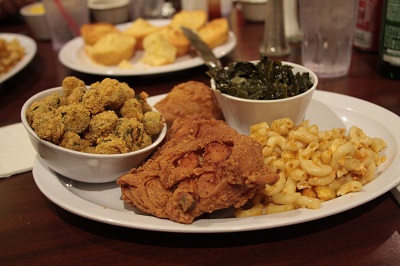 How Black history and culture have influenced American cuisine. By Maya Eaglin / NBC News
How Black history and culture have influenced American cuisine. By Maya Eaglin / NBC News
So much of what makes up American cuisine can be understood through our country’s complicated history. Chefs Jerome Grant and Ashleigh Shanti know this history keenly as culinary experts on the influence of Black cooks on American food. “Brown hands, minority hands were always behind the scenes of American hospitality and really helped grow what American hospitality is,” said Grant, the owner of Jackie in Washington, D.C., and the previous executive chef at the National Museum of the American Indian and the National Museum of African American History and Culture. “Whether we were slaves, indentured servants, feeding the cowboys or looking for new beginnings.” Read more
 Author James McBride asks us to peer behind ‘the boarded-up windows of Black America.’ By Betty Winston Bayé / Wash Post
Author James McBride asks us to peer behind ‘the boarded-up windows of Black America.’ By Betty Winston Bayé / Wash Post
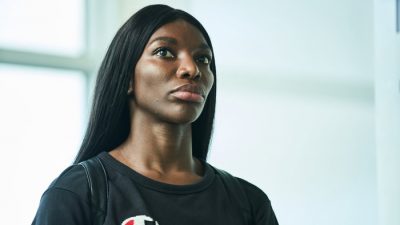 Lack Of Diversity Mars Golden Globe TV Nominations. By Eric Deggans / NPR
Lack Of Diversity Mars Golden Globe TV Nominations. By Eric Deggans / NPR
When it came time to pick the best TV shows of 2020 late last year, I and my fellow critics at NPR were all over the map. But there was one we could all agree on: Michaela Coel’s HBO drama I May Destroy You. A masterpiece, it was the only show that landed on everyone’s best-of list. So it was a surprise to look at the roster of nominees for the Golden Globe awards in television on Wednesday and not see her name or the show listed anywhere. Shown is Michaela Coel’s I May Destroy You which was a critical favorite last year. Read more
 Morgan Wallen and country music’s race issue is no surprise. By Lisa Respers France / CNN
Morgan Wallen and country music’s race issue is no surprise. By Lisa Respers France / CNN
Some in country music have signaled that they are no longer content to be associated with a painful history of racism. The Dixie Chicks last year dropped the “Dixie” in their name and the group Lady Antebellum became “Lady A” (though their following legal battle with a Black artist already named “Lady A” undercut that move in some fans minds). When rapper Little Nas X was kicked off the country charts in 2019 with his viral hybrid rap-country song “Old Town Road,” country star Billy Ray Cyrus stepped up to perform on the remix which then became an award-winning smash hit, including snagging Grammys for best pop duo/group performance and best music video. But there appears to be some hope that the industry can and will do better. Read more
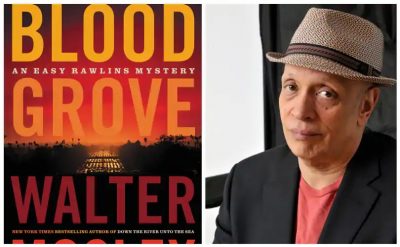 Walter Mosley’s new Easy Rawlins book is a masterful mix of mystery and social commentary. By Maureen Corrigan / Wash Post
Walter Mosley’s new Easy Rawlins book is a masterful mix of mystery and social commentary. By Maureen Corrigan / Wash Post
Since its debut in 1990, the Easy Rawlins series has charted a social history of Los Angeles, particularly focusing on shifting (or not) racial attitudes. “Devil in a Blue Dress” opened in a post-World War II Los Angeles when fate pushes Easy, an out-of-work Black Army vet, into his profession as a private investigator. Read more
 Malcolm & Marie movie review & film summary. By Roger Ebert
Malcolm & Marie movie review & film summary. By Roger Ebert
A director on the brink of success and his girlfriend spiral through their flaws and past sins in writer/director Sam Levinson’s two-hander “Malcolm & Marie,” now on Netflix. John David Washington and Zendaya star in the drama that’s been criticized for how it takes aim at film critics, but that’s only part of the conversation, and a part that feels like it’s not supposed to make the man spewing his own issues with the way people talk about him and his art look all that great. Read more
Sports
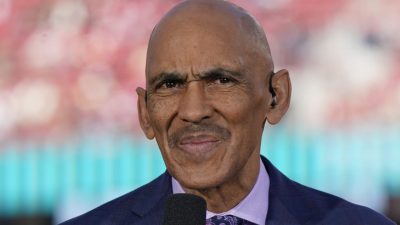 Tony Dungy roundtable on lack of Black NFL head coaches a must-watch. By Mike Freeman / USA Today
Tony Dungy roundtable on lack of Black NFL head coaches a must-watch. By Mike Freeman / USA Today
There’s a moment in a remarkable coaching roundtable hosted by Hall of Famer Tony Dungy that caused me to stop dead in my tracks while watching. The entire video can be seen here. It’s a smart piece of work and worth your time. Also in the video is former Colts and Lions coach Jim Caldwell, Atlanta Falcons President and CEO and member of the NFL’s Competition Committee, Rick McKay, and co-host of Peacock’s Brother From Another Michael Smith. Read more
Related: Black Coaches See the Limits of the NFL’s Racial Reckoning. By Jemele Hill / The Atlantic
 Black QBs making history in real time. By Martenzie Johnson / The Undefeated
Black QBs making history in real time. By Martenzie Johnson / The Undefeated
In 2020, Black quarterbacks proved that last season, which we dubbed the “Year of the Black Quarterback,” was no one-off. With each week, they further broke down the stereotypes of what a winning quarterback looks like. The days of Brady, Brees and Big Ben are numbered. Patrick Mahomes, Lamar Jackson, Deshaun Watson, Russell Wilson and others are bringing a new shade to the top tier of quarterbacks. See for yourself: 10 Black quarterbacks started in Week 1, the most ever in NFL history. Read more
 Dianne Durham, first Black US women’s gymnastics champion, dies. By The Associated Press and NBC News
Dianne Durham, first Black US women’s gymnastics champion, dies. By The Associated Press and NBC News
Dianne Durham, the first Black woman to win a USA Gymnastics national championship, died Thursday in Chicago following a short illness, her husband said. She was 52. Durham was a pioneer in American gymnastics. Her victory in the all-around at the 1983 national championships as a teenager was the first by a Black woman in the organization’s history. Read more
Site Information
Visit our home page for more articles, book/podcast and video favorites. And at the top of this page register your email to receive notification of new editions of Race Inquiry Digest. Click here for earlier Digests.
About Race Inquiry and Race Inquiry Digest. The Digest is published on Mondays and Thursdays.
Use the buttons below to share the Digest in an email, or post to your Facebook, Linkedin or Twitter accounts.